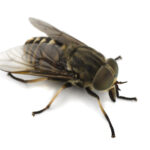Fruit flies are notorious for seemingly appearing out of thin air and quickly becoming a nuisance in homes. This rapid infestation isn’t magic; it’s due to their biology and attraction to specific conditions commonly found in houses. Understanding what draws them in is the first step to preventing and managing these tiny pests.
The Biology of Fruit Flies and Why They Appear
Fruit flies have an incredibly fast life cycle. They can lay up to 500 eggs at a time, often on the surface of fermenting or rotting fruits and vegetables, or even in unclean drains. These eggs hatch quickly, and the entire life cycle, from egg to adult, can be completed in about a week under favorable conditions. This rapid reproduction rate explains why a few fruit flies can quickly turn into a significant infestation. They are highly attracted to the odors of fermentation and decay, which guide them to potential food sources and breeding grounds.
Common Causes of Fruit Flies in Your Home
Several factors within a typical home environment can attract fruit flies:
- Overripe Produce: The most common culprit is overripe or rotting fruits and vegetables left out on counters. Fruit flies are drawn to the sugars and fermentation processes happening in these items. Even a small piece of forgotten fruit can become a breeding ground.
- Unclean Drains and Garbage Disposals: Drains, especially kitchen and bathroom drains, can accumulate organic matter like food scraps and hair. This moist, decaying environment is perfect for fruit flies to lay eggs and breed. Similarly, garbage disposals that aren’t cleaned regularly can also become breeding sites.
- Spills and Food Residues: Sticky spills of sugary drinks, juice, or even alcoholic beverages can attract fruit flies. Food residues left on countertops, tables, or in pantries also provide food sources.
- Contaminated Items Brought Indoors: Sometimes, fruit flies or their eggs can be brought into the house unknowingly on fruits and vegetables purchased from the store or garden. These pests can then emerge and start an infestation if conditions are right.
Prevention and Removal Strategies
To effectively prevent fruit flies, focus on eliminating their food sources and breeding sites:
- Promptly Dispose of Overripe Produce: Don’t leave ripe fruits and vegetables sitting out. Store them in the refrigerator or dispose of them immediately when they start to overripen.
- Regularly Clean Drains and Garbage Disposals: Flush drains with hot water and cleaner regularly to remove organic buildup. Use a brush to scrub garbage disposal blades and walls to eliminate food debris.
- Clean Spills Immediately: Wipe up any spills, especially sugary liquids, as soon as they occur.
- Maintain Cleanliness in Kitchen and Pantry: Keep countertops, tables, and pantry shelves clean and free of food residues.
- Inspect Produce Brought Indoors: Check fruits and vegetables for signs of fruit flies before bringing them inside, especially during warmer months.
While these DIY methods can be effective, a severe fruit fly infestation might require professional pest control. Pest control experts can identify and eliminate breeding sites you might have missed and provide targeted solutions to manage the problem effectively. If fruit flies are a persistent issue in your home, contacting professionals is a wise step to take.
